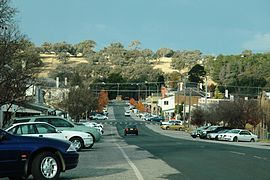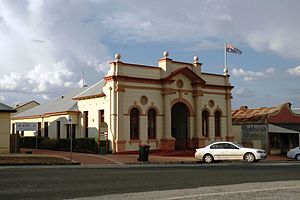- Molong, New South Wales
-
Molong
New South Wales
The main shopping area of Molong, Bank StreetPopulation: 1,569 (2006 Census)[1] Postcode: 2866 Coordinates: 33°06′S 148°51′E / 33.1°S 148.85°ECoordinates: 33°06′S 148°51′E / 33.1°S 148.85°E Elevation: 565 m (1,854 ft) Location: - 296 km (184 mi) W of Sydney
- 36 km (22 mi) NW of Orange
- 65 km (40 mi) S of Wellington
- 24 km (15 mi) SW of Cumnock
LGA: Cabonne Shire Council State District: Orange Federal Division: Calare Mean max temp Mean min temp Annual rainfall 22.3 °C
72 °F6.2 °C
43 °F701.9 mm
27.6 inMolong is a small town in the Central West region of New South Wales, Australia, in Cabonne Shire.
Molong is located on the Mitchell Highway about 300 kilometres west of Sydney and about 30 kilometres from the city of Orange. It is elevated at 529 metres above sea level. At the 2006 census, Molong had a population of 1,569 people.[1] Charles Sturt visited Molong in 1828. Molong was the site of the first copper mine in Australia, located at Copper Hill just outside of Molong.
William Lee of Kelso is said to have had cattle in the area by 1819. He later held property just north of present Molong, around Larras Lee. In 1826 a military and police outpost was established at Molong, on Governor Darling's orders, as a step in opening up the government stock reserve west of the Macquarie River for settlement.
The Historical Museum is housed in a former hotel (1856), built by rubble-mason James Mortal, who sold it in 1861 to John Smith of Gamboola. Smith let the building to a series of publicans and it later became the residence and surgery for a series of doctors. The Historical Society acquired it for use as a museum, in 1969, with help from the Molong Shire Council.
History
The name Molong comes from the aboriginal word for 'all rocks'.[2]
The railway from Sydney reached Molong in 1886; it was later extended to Parkes.[3] A branch railway to Dubbo was opened in 1925 and closed in 1987.[4]
Notes
- ^ a b Australian Bureau of Statistics (25 October 2007). "Molong (Urban Centre/Locality)". 2006 Census QuickStats. http://www.censusdata.abs.gov.au/ABSNavigation/prenav/LocationSearch?collection=Census&period=2006&areacode=UCL153800&producttype=QuickStats&breadcrumb=PL&action=401. Retrieved 31 October 2009.
- ^ "Molong". Geographical Names Board of New South Wales. http://www.gnb.nsw.gov.au/name_search/extract?id=anQlFxWAMa. Retrieved 31 October 2009.
- ^ "Broken Hill Line". www.nswrail.net. http://www.nswrail.net/lines/show.php?name=NSW:broken_hill. Retrieved 2007-01-20.
- ^ "Molong - Dubbo Line". www.nswrail.net. http://www.nswrail.net/lines/show.php?name=NSW:molong_dubbo. Retrieved 2007-01-20.
External links
Towns in the Cabonne Shire Local Government Area Borenore · Canowindra · Cargo · Cudal · Cumnock · Eugowra · Manildra · Molong · Mullion Creek · Nashdale · Ophir · Yeoval
Main Article: Local Government Areas of New South WalesCategories:- Towns in New South Wales
- Towns in the Central West, New South Wales
Wikimedia Foundation. 2010.


